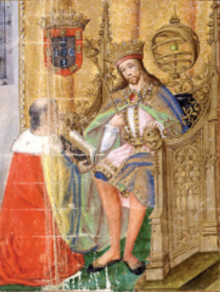Rui de Pina

Rui de Pina (born 1440 in Guarda , Kingdom of Portugal ; died 1521 ), also in the spelling Ruy de Pina , was a Portuguese chronicler ( cronista-mor ) and diplomat .
life and work
Rui de Pina was born in Guarda in 1440 . In the service of the Portuguese John II , he was sent on several diplomatic missions, including the representation of Portuguese interests in Barcelona after the trip of Christopher Columbus in the negotiations before the Treaty of Tordesillas on the division of the discovered areas between Portugal and Spain.
In 1497 he was appointed chief chronicler of the kingdom and custodian of the Torre do Tombo and the royal library by Manuel I. The activity as a chronicler under Johann II is said to have started around 1490.
He wrote the chronicles of several kings of Portugal , including Sancho I, Alfons II, Sancho II, Alfons III, Dionisio I, Alfons IV, Edward I, Alfons V and John II. In the office of Supreme Chronicler ( Cronista-mor ) he took the monarchist point of view.
The chronicles from Sancho I to Dionysius were published between 1727 and 1729 by Miguel Lopes Ferreira in Lisbon, the three chronicles of Edward I, Alfonso V and John II were published by the Academy of Sciences in Lisbon between 1790 and 1792 ( Academia the Ciências de Lisboa ). Some of them were published in the Bibliotheca de classicos portuguezes .
Rui de Pina was extremely influential in his time. According to the testimony of João de Barros , Afonso de Albuquerque (1453-1515), the governor of Portuguese India , sent him a number of jewels to ensure that he would not be overlooked in his chronicles.
Works (selection)
The Bibliotheca de classicos portuguezes, for example, contains:
- 12 Chronica de el-Rei D. Duarte .
- 13 Chronica de el-Rei D. Affonso V .
- 21 Chronica de el-Rei D. Sancho I .
- 22 Chronica de el-Rei D. Affonso II e de El-Rei D. Sancho II .
- 23 Chronica de el-Rei D. Affonso III.
See also
- Academia das Ciências de Lisboa (Portuguese)
References and footnotes
- ↑ title page
- ↑ after Alexandre Herculano, foreword to the Chronica d'el-rei Dom Duarte by Ruy de Pina, 1901, Lisboa: Escriptoria, p. 10 (there with the comment: “Triste documento de que os génios mais portentosos estão como os homens ordinários sujeitos ás mais ridículas fraquezas. ")
literature
- Alexandre Herculano : Introduction to Ruy de Pina: Chronica d'el-rei Dom Duarte , 1901, Lisboa: Escriptoria, digitized version (contains a more extensive account of Pina's life)
Web links
- Iluminura no tempo de D. Manuel I
- Rui de Pina (partial online view)
- Works by or about Rui de Pina in the internet archive
| personal data | |
|---|---|
| SURNAME | Pina, Rui de |
| ALTERNATIVE NAMES | Pina, Ruy de |
| BRIEF DESCRIPTION | Portuguese chronicler (cronista-mor) and diplomat |
| DATE OF BIRTH | 1440 |
| PLACE OF BIRTH | Guarda |
| DATE OF DEATH | 1521 |
